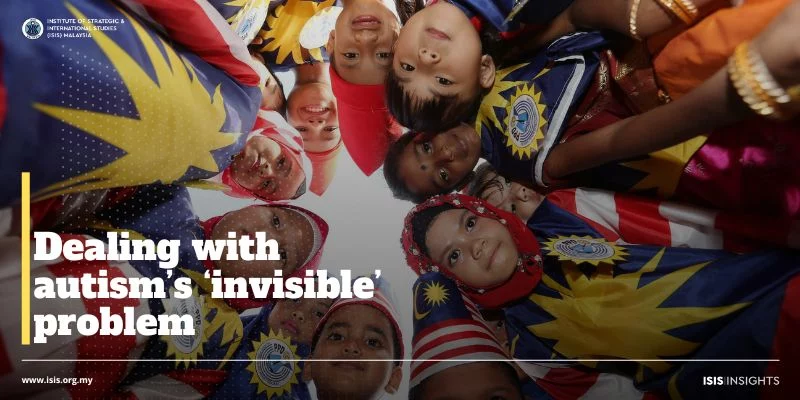New govt must adopt suggestion to set up council to provide relief for ASD families
EVERY 3 December, the United Nations celebrates the International Day of Persons with Disabilities – a day to raise global awareness of disability issues and encourage support for their rights, dignity, and welfare. This year’s theme is “Not All Disabilities are Visible”.
One such non-visible disability is autism and the incoming government needs to do more for Malaysians living on the autistic spectrum by creating awareness, understanding and acceptance.
Autistic people perceive, hear and feel the world in unique ways. If you are autistic, you will remain autistic for the rest of your life. There is no “cure” for autism and being autistic is a fundamental aspect of one’s identity.
According to the National Autism Society of Malaysia (Nasom), one in 68 infants develops autism and exhibits behaviours associated with autism spectrum disorders (ASD).
Autistic children between the ages of two and six typically have the following behaviours: not afraid of danger, overly sensitive or insensitive to pain, avoiding eye contact, having trouble expressing wants or needs, consistent routine and difficulty interacting with others.
Health Ministry data shows that in the past 10 years, the number of diagnoses for ASD has increased exponentially in Malaysia. According to its 2021 annual report, 589 children under 18 were diagnosed with ASD, which represents a staggering 500% jump from just 99 in 2009.
Adults with autism continue to be underrepresented despite rising numbers globally, from growing public awareness and changes to diagnostic criteria. People diagnosed with autism may have been misdiagnosed with other conditions, such as intellectual disability.
Just 500,000 or only 10% of Malaysia’s estimated 4.86 million people living with disabilities are registered as orang kurang upaya (OKU) to receive welfare assistance. The government arrived at such an estimation because former deputy prime minister Datuk Seri Dr Wan Azizah Wan Ismail found 500,000 too low for a country with a population of 32.4 million. Hence, Nasom’s advocacy that autism should not be regarded as a rare disease but a common developmental disability.
Gaps in knowledge also contribute to disparities in the availability and quality of assistance. One such example is the Education Ministry encouraging autistic children to participate in mainstream education but failed to equip teachers with resources and training to absorb such pupils.
Things are no better in private schools. The number of ASD pupils is often capped, and parents have to pay for a shadow teacher. As for job prospects, a major worry for aging parents, there have been no attempts to incorporate technical and vocational education and training (TVET) education for autistic pupils.
If not given the chance to attend school and gain an education or livelihood, what kind of future are they expected to have in this country?
Nasom launched an e-commerce programme to educate youth with autism in digital marketing and e-commerce. Gamuda’s Enabling Academy provides autistic youth with skills needed for employment.
At the grassroots, the Ideas Autism Centre offers affordable care to children 3-9 with parents only paying RM300 out of a total cost of RM3,000. The Autism Cafe Project is a parent’s unwavering love to give F&B training for his autistic son and others.
Selangor’s Program Bantuan Anak Istimewa Selangor (ANIS) provides free early intervention centres for special needs children and training for parents.
But these localised efforts can only achieve so much, hence the rationale for the government to go beyond a monetary approach.
In Budget 2023, children with special needs will be able to access early intervention programmes, despite a meagre RM5 million to increase the number of OKU taskas from 13 to 63.
RM20 million was also allocated to upgrade the buildings, teaching materials, and equipment of special needs schools, plus a RM1.2 billion in allowances for OKU and disabled workers.
This will ease the financial burden for families from B40 and M40 households, but at RM200 (below six) and RM150 (7-18) a month per child, it is wholly inadequate. More worryingly, many parents prefer to not register their child over fears of social “stigma.”
We need to change this mind-set. As the number of people diagnosed continues to rise, government policies, programmes and campaigns must be increased to address the stigma and lack of support.
Former health minister Khairy Jamaluddin has provided a solution in the form of a cabinet paper to set up a national autism council. Its role would include streamlining education, treatment, and post-diagnosis care. It can also seek industry wide insurance coverage for those suffering from autism.
Khairy went on to propose an integrated intervention strategy centred on evidence-based parent training, and the council would act as the platform for the dissemination of autism-related materials to the public.
What is most important, however, is that the council would provide the national support that ASD families desperately need and hold the government accountable.
This article was also published as “Proposed autism council can improve awareness, acceptance” in New Straits Times on 3 December 2022





